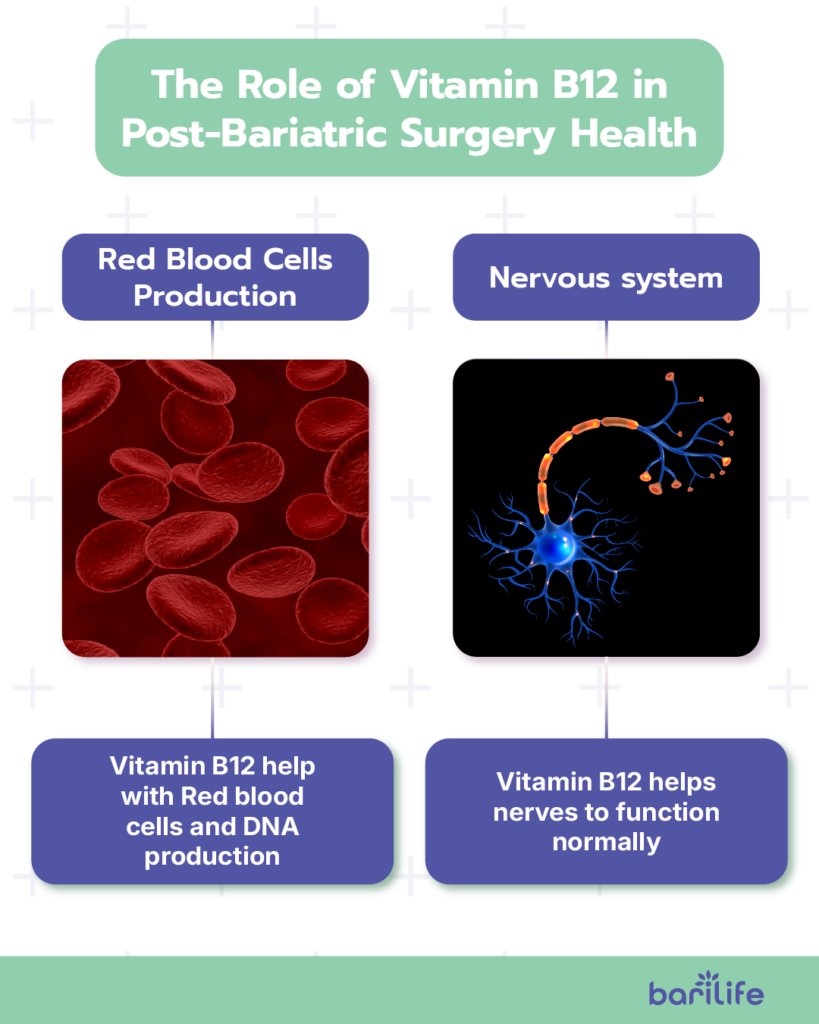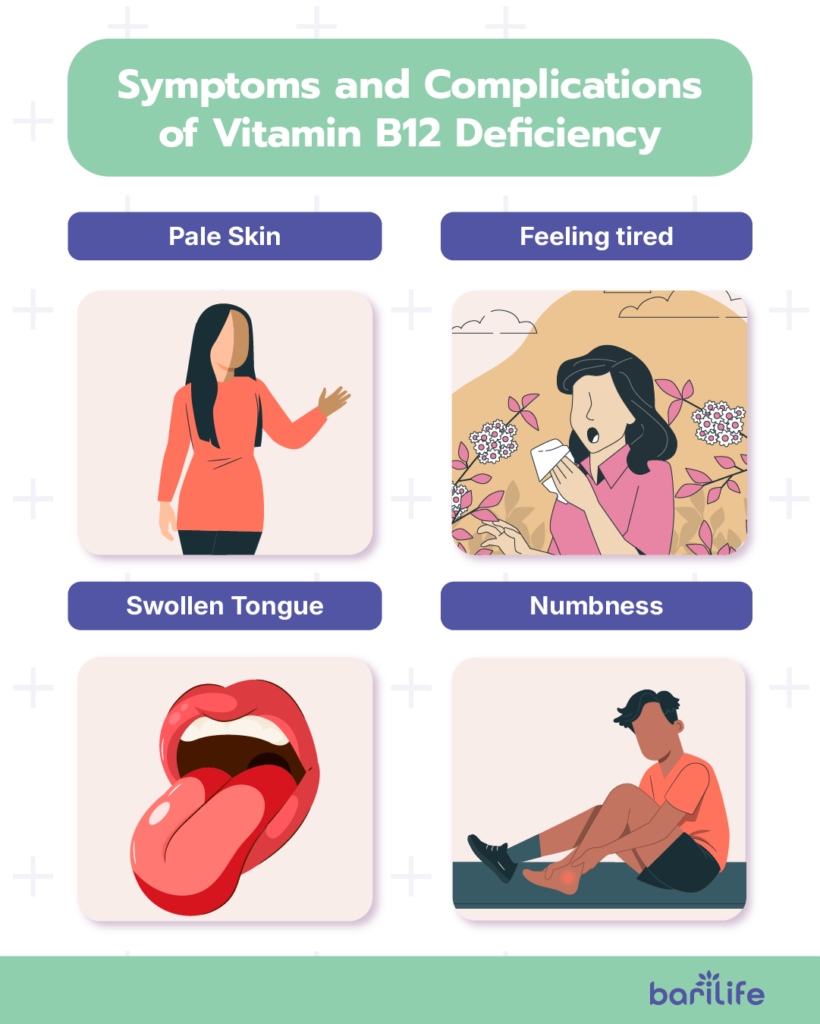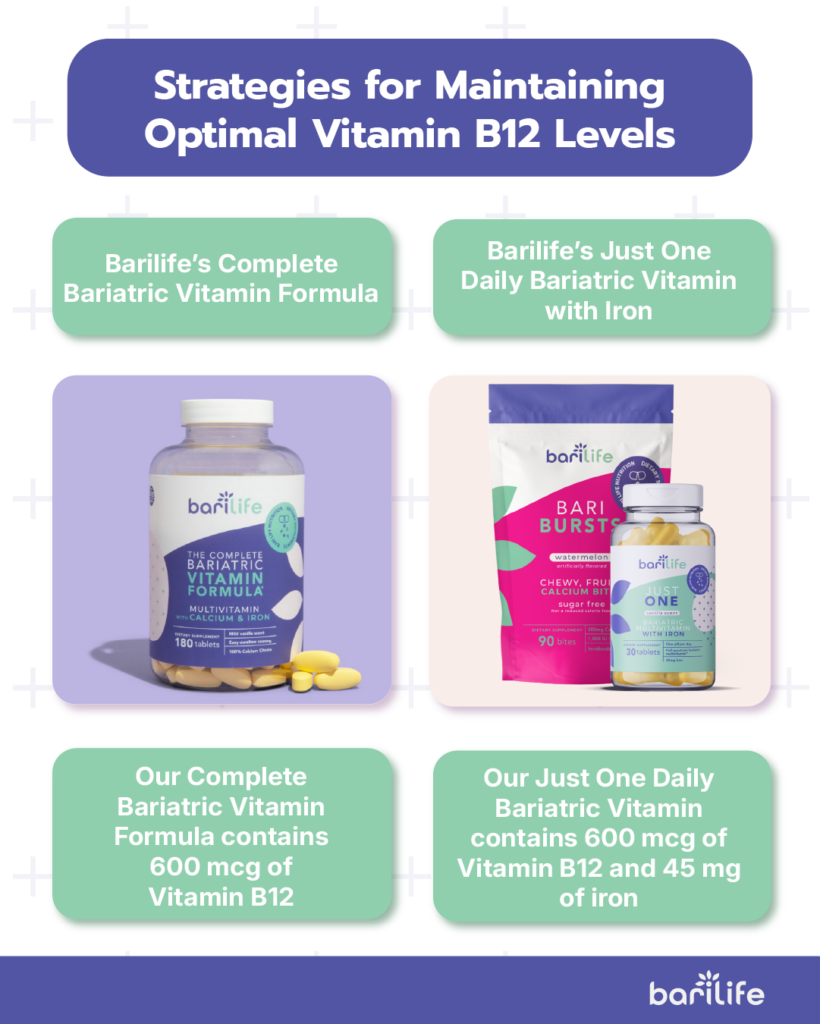Key Takeaways
- Bariatric surgery significantly alters how well your body can absorb vitamin B12
- Being deficient in vitamin B12 over an extended period can lead to irreversible damage
- Finding a supplement with a vitamin B12 dose that meets your needs after bariatric surgery is essential
Vitamin B12 deficiency is common after bariatric surgery and, if not corrected, can cause serious complications to your red blood cell production, cognitive health, and nervous system.
Due to changes made to your digestive system during bariatric surgery, it’s harder for your body to absorb this necessary vitamin. If you had a Roux-en-Y gastric bypass surgery, you are especially at risk for low vitamin B12.
Read on to learn about how vitamin B12 affects your health, why its absorption is disrupted after surgery, how much you need, and more.
Table of Contents
The Role of Vitamin B12 in Post-Bariatric Surgery Health
Vitamin B12 plays an important role in maintaining your overall health after bariatric surgery. You need vitamin B12 to produce red blood cells and support DNA production. This is critically important after surgery to prevent developing anemia (a low red blood cell count).
Vitamin B12 also plays a role in the health of your nervous system. It helps your nerves function properly and affects your ability to think clearly, focus, and make decisions.
Lastly, vitamin B12 helps your body convert food into energy, supports your metabolism, and is particularly important if you are feeling extra tired and low in energy after bariatric surgery due to your reduced nutrient intake.
Consider adding bariatric protein shakes to your diet to further support your energy levels.

Mechanisms of Vitamin B12 Absorption Disruption
After bariatric surgery, several factors reduce your body’s ability to absorb vitamin B12, leading to deficiency.
Bariatric surgeries, especially Roux-en-Y gastric bypass, reduce the amount of intrinsic factor your stomach lining produces. Intrinsic factor is a protein you need to absorb vitamin B12 in your small intestines.
After bariatric surgery, you also don’t produce as much stomach acid as before. Stomach acid helps to break down foods containing vitamin B12. Without as much stomach acid, your body has less vitamin B12 available to absorb.
Some bariatric surgeries, specifically the Roux-en-Y gastric bypass, reroute food away from the areas of your digestive system where most of the B12 is absorbed. This is another factor that can lead to poor vitamin B12 absorption.
Fiber after bariatric surgery also plays a role in ensuring optimal digestive health, so it’s important to consider adding fiber supplements to your diet.
Symptoms and Complications of Vitamin B12 Deficiency
If you are only slightly low in vitamin B12, you may not have any symptoms, or your symptoms may be mild. Mild symptoms can include:
- Pale skin
- Feeling irritable
- Loss of appetite
- Diarrhea or constipation
- Feeling short of breath when exercising
- Swollen and red tongue or bleeding gums
- Feeling tired or lightheaded with light exertion
If your vitamin B12 stays low for a longer period of time, your nerves may experience some damage, which can cause other, more serious symptoms such as:
- Confusion
- Hallucinations
- Trouble concentration
- Having trouble balancing
- Numbness and tingling in your hands and feet

Recommended Daily Intake of Vitamin B12
For most adults, health professionals recommend taking 2.4 mcg of B12 daily. However, after bariatric surgery, you need to increase your daily dose of B12.
Because your body can’t break down foods or absorb B12 as well after bariatric surgery, you may need to take 350-500 mcg of vitamin B12 daily or get a once-a-month injection of 1,000 mcg.
The precise amount you need depends on the type of surgery you had and other factors. Talk with your healthcare provider for specific guidelines.
Also, you’ll need to have regular blood tests to make sure your vitamin B12 is staying within a healthy range.
Strategies for Maintaining Optimal Vitamin B12 Levels
Several key strategies can help you maintain your vitamin B12 level after surgery.
You’ll need routine blood tests to detect any decrease in your B12 levels. Your healthcare provider can adjust your daily or monthly dose to help prevent long-term nerve damage and more serious symptoms.
Choosing the right supplement is also a key strategy. Some people prefer to take a sublingual (under the tongue) daily supplement or a monthly injection of B12 as both of these methods bypass the digestive system and help avoid poor absorption issues. However, more research is needed as to which route is the best after bariatric surgery.
You can also take vitamin B12 as part of an oral daily supplement tablet or liquid or as a nasal spray.
Lastly, it’s super important to remain consistent with taking your bariatric vitamins. This is a life-long commitment to your overall health as your dietary intake alone will not be enough to meet your body’s needs after surgery.
Bari Life offers two supplements that contain vitamin B12, specially dosed to meet what you need after bariatric surgery.
The Complete Bariatric Vitamin Formula tablets contain 600 mcg of vitamin B12 along with other vitamins and minerals you need daily. If you have trouble swallowing tablets, this vitamin also comes in a deliciously refreshing watermelon-flavored powder. You can mix it with water once a day.
Bari Life’s once-daily bariatric multivitamin with iron, Just One, also contains 600 mcg of vitamin B12 and 45 mg of iron, along with a long list of other essential minerals and vitamins. This single-dose tablet meets the ASMBS recommended daily values for all your multivitamin and iron needs.

Conclusion
Vitamin B12 is an essential nutrient that plays an especially important role in your body after bariatric surgery.
Bariatric surgery causes changes to your digestive system that make it difficult to maintain a healthy level of vitamin B12. However, you can avoid becoming deficient by consistently taking a supplement and getting regular blood tests to check your level.
It’s important to discuss with your healthcare provider how much iron should a bariatric patient take to ensure you maintain a balanced intake of essential nutrients.
Keeping your vitamin B12 in an optimal range helps you prevent post-surgery complications and live a healthier life.
If you want to learn more, why not check out these articles below:
- Best iron supplement for bariatric patients
- Best calcium citrate for bariatric patients
- Best collagen for bariatric patients
- Best probiotic for bariatric patients
References
Vitamin B12 Deficiency Anemia. (2024). MedlinePlus.
Vitamin B12: Fact Sheet for Health Professionals. (2024). National Institutes of Health.




What are your tips and tricks to post-bariatric success?